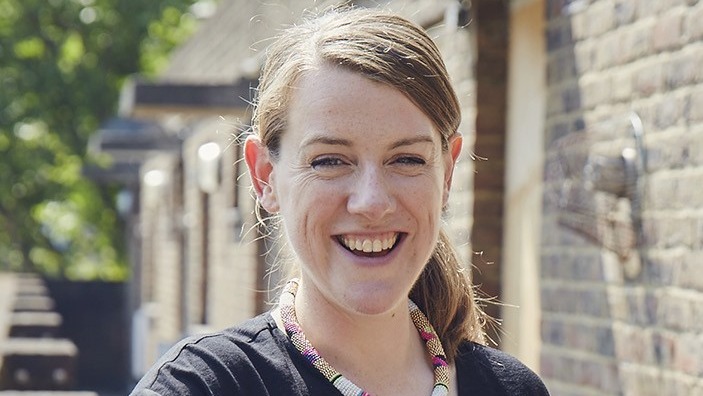About
Name: Katharine Hibbert
Nationality: British
Programme: Cambridge EMBA 2020
Current role: Founder of Dot Dot Dot Property Ltd and Chair of Co-Op Homes
Industry sector: Entrepreneurship

Katharine’s journey
Already a successful entrepreneur when she joined the Executive MBA programme in 2020, Katharine Hibbert (EMBA 2020) has gone from strength to strength. Dot Dot Dot, the UK social enterprise she founded in 2011 that turns empty space into inexpensive homes for people who want to volunteer, now employs 25 people and is delivering thousands of working hours for the charity sector.
Social enterprise and business can go hand in hand
Katharine was initially drawn to work in housing due to the shortage of high-quality, affordable homes, which she sees as the underlying cause behind many societal and economic problems. Dot Dot Dot provides people with homes priced significantly below local market rents, making it a good alternative to the private rental sector. It does this by working with property owners who are carrying out large-scale regeneration projects. Such projects can result in buildings lying empty for years while waiting for work to begin, which is a problem for owners and neighbours alike. Dot Dot Dot does up these buildings to house people who will be great neighbours, take good care of the place where they live, and volunteer at least 16 hours a month for a charitable cause of their choice. The aim is to deliver an excellent service to property owners whilst also helping residents to volunteer in ways they enjoy and be a positive presence in their communities.
Last year, Dot Dot Dot housed more than 300 people in 15 different locations around the country. They volunteered for more than 400 different charities, giving more than 35,000 hours – the equivalent of nearly 5,000 working days – worth more than half a million pounds if paid at the living wage. The guardians are also very diverse: last year, the youngest was 18 and the oldest 74; 46% were from non-white backgrounds; 22% identify as LGBTQ+, and 8% consider themselves to have a disability.
Katharine enjoys the mechanics of running a business, commenting, “It’s really interesting to be under the bonnet of a business, trying to figure out how you can adjust things and move things around to improve the running of the engine.” This desire to hone the business engine was behind Katharine’s decision to pursue an Executive MBA. She says, “I wanted to make sure that I wasn’t missing out on areas of expertise that would be really useful to me and the business.”
The EMBA instilled in me the confidence to make more ambitious decisions
The EMBA has provided Katharine with a toolbox, a range of models and approaches to apply to questions as they occur. She cites the negotiation course as an example. “The course gave me a set of tools that I can use in a range of situations, whether it’s developing the business or negotiating with colleagues about salaries. I can apply the frameworks I learned in so many different situations, including in my personal and social life.”
Katharine continues, “There’s a lot of emphasis within the course on overcoming your cognitive biases. It’s not about having a particular mathematical formula that you apply, but about being aware of where you might be making avoidable mistakes on a habitual basis and having ways to challenge them.”
The most difficult conversations are often the most useful
For Katharine, a highlight of the course was the opportunity to engage in open and frank discussions with people with whom she might disagree significantly on political or social issues. She comments, “I’m passionate about the need to reduce carbon emissions, but this doesn’t mean that I can’t have a perfectly good conversation with a geologist who’s working on developing new oil fields. It’s always useful to get out of your own bubble and see things from other perspectives.” Whereas, in the workplace, disagreement can be problematic, the EMBA programme provided an environment for open and frank discussion.
The diverse cohort enabled a cross-pollination of ideas
Katharine continues, “Perhaps the most valuable thing was the opportunity to work with people who are from really different backgrounds, sectors and cultures and who have different attitudes to getting things done. If you present a homogeneous group with a novel task, they’ll get the work done quickly and will feel satisfied with the result. When you all agree with each other, you think: ‘we sorted that brilliantly’. But in a heterogeneous, mixed group, solving the task will be more painful and take longer, but you might reach a better outcome.”
Katharine’s advice to other women considering an EMBA is twofold: “First, be really clear in your mind about what you want to achieve, whether it’s networking, achieving top academic marks, making the most of the wider opportunities Cambridge University offers or something else. There are so many dimensions to the EMBA that it’s hard to do everything, and you might have to prioritise. Second, don’t feel intimidated. One of my fears was not being able to compete with my peers who’d been working in, say, finance for years. I thought they’d have all the answers at their fingertips. It’s not like that. You’re all there to learn, and you might be surprised by the areas of expertise you have that you take for granted.”

